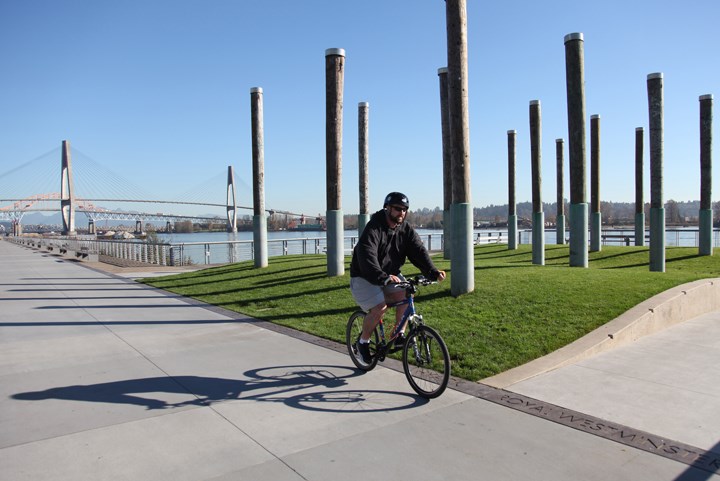The City of New Westminster’s approval of a new pedestrian overpass into Westminster Pier Park has stunned a local council watcher who was promised the city would only do so after a full tender process.
Christopher Bell is sounding alarms about the process being followed by the city and the awarding of a contract without going through a tender process. Like other community members, Bell believes the park needs better access.
“I am not against a tender and a contract being awarded – I am opposed to the secrecy of this whole thing, where a senior manager assured me after a consultant looked at it they would be coming back with a public tender in the future,” he said. “This isn’t chump change.”
Bell recently inquired about the pedestrian overpass and was shocked by the response he received. In an email from the engineering department, staff stated that council approved the award of this project on Jan. 6, and additional details regarding the design, schedule and contractor would be posted to the city’s website shortly.
Acting mayor Lorrie Williams confirmed that council had discussed the matter at a Jan. 6 closed meeting, but couldn’t comment on the matter until it is brought out of the in camera meeting.
“I don’t think it has been released,” she told The Record. “We just got the numbers.”
Last September, the city cancelled a tender process for the overpass after bids came in higher than anticipated. The city had originally budgeted $1.3 million for the overpass, and later increased the budget to $1.85 million, but officials wouldn’t disclose the bid amounts to The Record.
Because the bids exceeded the budget, the city canceled the tender process last fall and started working with its consultant to see if there were ways of reducing costs and to question bidders as to why costs were higher than anticipated.
"If after those conversations, which are happening right now, we don't think that we can find a significant cost savings, then we will have to look at a lesser structure,” Roger Emanuels, the city’s manager of design and construction, told The Recordin September. “When it first went to council we talked about an iconic structure. So is there a way of lightening it up and reducing costs that way, or do we look at an alternate access point?"
The pedestrian overpass would take people from the Front Street parkade into Westminster Pier Park. Currently, the park is only accessible via a parking lot at the west side of the riverfront site.
In addition to costs, the city also wanted to discuss park access with Larco, which owns the site next to the park. In December, the city announced a new vision for the Larco site, which includes three highrises (instead of the five currently allowed) and a new 0.8 hectare (two acre) park.
It was unknown at The Record’s press time whether the Larco site has played a role in the city’s anticipated announcement about the pedestrian overpass, or if the design had been changed and one of the original bids had been selected. Senior staff didn’t return calls by The Record’sdeadline.
News that the city has awarded a contract for the overpass comes as a surprise to longtime council watcher Bell, who is concerned it wasn’t retendered as had staff had suggested would be done. In an email to Bell in September, staff stated that the project will be retendered if cost savings can be found to bring the project closer to the budget amount.
“Instead of publicly retendering the project, the city held a secretive in-camera meeting where the contract was approved without any public tender,” Bell said. “Why the secrecy? Why the arrogant casting aside of open government, transparency, and public accountability? Why the patronizing ‘father knows best’ attitude as our council decides behind closed doors what is in the best interest of New Westminster citizens?”
Bell said all the people who applied for the first tender would have thought the process was cancelled. In addition to questioning the approval process, he’s also concerned about council’s consideration of the matter.
“The Community Charter lists a lot of things that can happen at an in-camera meeting but approving capital works contracts is not one of them,” he told The Record. “The Community Charter outlines the process the city must follow to have an in-camera meeting, but the city did not follow the legislated process.”
Bell has been critical of the city’s tendering process, as well as its new procurement policy.
The new procurement policy addresses issues such as spending thresholds, authority to commit city funds, sole and single sourcing considerations and variances to project budgets. Staff updated the policy in response to changes in provincial trade agreements, changes in best practice in municipal procurement, increases in procurement volumes and the need to streamline the process.
Bell believes sole sourcing prevents competition and fails to consistently ensure the best value for money and can lead to accusations of bias and favouritism towards city “insiders” and those who have done work with the city in the past.
Bell states that the city has done sole sourcing of contacts even before the new policy took effect.
As an example, he said the city extended the contract to the company that had been awarded its 2010 pavement management program (through a tendered process) to include 2011, as well. Staff told Bell the city was able to negotiate with the contractor to carry the 2010 unit pricing over to 2011, so the city was assured of getting good value for its purchasing dollar.
“It leads to cronyism, it leads to favouritism – I am not saying it is occurring. It leads to laziness in terms of staff, going out there and finding the lowest bid. It’s secretive. It’s exclusive,” he said. “It drives me crazy.”



